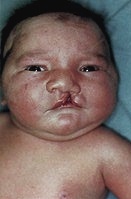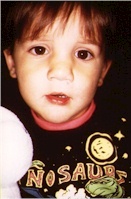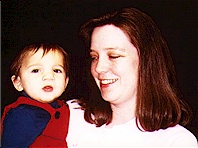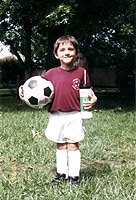
 We knew something was wrong when the ultrasound technician suddenly stopped talking. She began to frown, and
silently seemed to intensify her efforts, scanning over the same area again and again up to that point she had
been friendly and talkative, making the abrupt quiet in the room all the more chilling. It was troublingly
reminiscent of an ultrasound we'd had with our second child, when at seven months the screen silently revealed
a baby's heart that was no longer beating. Now here we were again, two more wonderful children and six years
later, once more at seven months pregnant, faced with a shadowy image that had all at once changed from joy to
worry.
We knew something was wrong when the ultrasound technician suddenly stopped talking. She began to frown, and
silently seemed to intensify her efforts, scanning over the same area again and again up to that point she had
been friendly and talkative, making the abrupt quiet in the room all the more chilling. It was troublingly
reminiscent of an ultrasound we'd had with our second child, when at seven months the screen silently revealed
a baby's heart that was no longer beating. Now here we were again, two more wonderful children and six years
later, once more at seven months pregnant, faced with a shadowy image that had all at once changed from joy to
worry.
An apparent cleft lip, she finally reported.
Often, but not always, accompanied by a cleft palate -- she couldn't tell about the palate from the ultrasound.
Everything else looked fine, she said small comfort.
We began searching for and reading everything we could find
about cleft lips and palates. And we prayed. We believe that God can heal people, even a baby in the womb. So we
prayed for the best and prepared for the worst.
A friend called us and said that she had seen a story on
the TV news about a local plastic surgeon who had just fixed a cleft lip at birth. We were surprised, because
everything we had been reading indicated that surgery was out of the question until at least four months, for the
lip, and even longer for the palate repair. We were therefore intrigued and curious as we made an appointment
with Dr. Bill Magee of Norfolk. When we met with Dr. Magee in his office, we almost immediately felt at ease,
and that we were now in the hands of someone who had the answers we needed. He explained that advances in
pediatric anesthesia, coupled with his own extensive experience with craniofacial repairs on his medical
missions around the world with Operation Smile, had convinced him that cleft lips could, and should, be
repaired at birth. His confidence and optimism were contagious. We asked if he could put us in touch with
some of the families who had gone through the early surgery. He mentioned a newborn that he had operated on
just a few weeks before. It was the first such early repair that he had done. Ours would be the second. Were
we crazy, we wondered, to even consider what seemed like experimental surgery on our baby?
As if the pregnancy were not already unusual enough, Carole
went into labor early on Doug's birthday. As a veteran of four natural childbirth events, Carole was ready for
anything. At almost eleven pounds, however, Aaron was not configured to cooperate. After hours of unproductive
labor, and with Aaron essentially wedged into Carole's pelvis, it was time for a C-section. When they finally
lifted him out, Doug asked whether there was a cleft lip. Yes. Palate, too
We were both prepared and surprised. We had hoped and prayed
that God might heal him before his birth. That evening Dr. Magee and his wife visited us in the hospital. They
had also stopped by the special-care nursery to see Aaron. "We can fix that," Dr. Magee said.
''Everything will be fine." We believed him. An infection and fever delayed for another day any immediate
surgery. In the meantime, Aaron's two brothers and sister, and Grandma, came to visit in the hospital.
Everybody held the baby, carefully working around the IV tubes. We all agreed that he was a beautiful baby.
 On the third day of Aaron's life, Doug put him in a car-seat and
drove him to the Children's Hospital of the King's Daughters in Norfolk. Carole stayed behind for a short
time, still recovering from the C-section. As Doug waited and prayed in the waiting room, Aaron became the third
baby ever (as far as we know) to have a cleft lip repaired at birth (another patient had snuck in front of
us!). Carole wrangled an early release from her hospital, and we all rendezvoused in the recovery room, together
with a camera crew from a local television station that had been following our story. Aaron's lip was stitched
and bloody and black and blue, but it was fixed.
On the third day of Aaron's life, Doug put him in a car-seat and
drove him to the Children's Hospital of the King's Daughters in Norfolk. Carole stayed behind for a short
time, still recovering from the C-section. As Doug waited and prayed in the waiting room, Aaron became the third
baby ever (as far as we know) to have a cleft lip repaired at birth (another patient had snuck in front of
us!). Carole wrangled an early release from her hospital, and we all rendezvoused in the recovery room, together
with a camera crew from a local television station that had been following our story. Aaron's lip was stitched
and bloody and black and blue, but it was fixed.
Of course, this was not the end of our problems, but the
beginning. With a cleft palate, Aaron's ability to suck was impaired, and despite our best efforts, he began to
lose weight. We entered into a several-month period of round-the-clock feeding: two and a half hours with the
bottle, half an hour off, then start again. The occupational therapist visited often, with new techniques
to stimulate sucking. and boxes of special soft plastic bottles and special nipples. The pediatric dentist made
an obturator, a plastic retainer-like device, to fit in the roof of Aaron's mouth, to try to help him create a
vacuum so he could suck. It didn't work. Our wonderful pediatrician, Dr. Gary Krebs, kept us supplied with
special high-protein baby formula, which probably kept Aaron from wasting away completely. As it was, he was
skin and bones, and at four months did not look nearly so healthy (nor as heavy) as when he was first born.
 Enter, again, Dr. Magee. He believed that surgical repair of the
palate could help with the feeding problems. Most surgeons waited until at least eighteen months to fix the
palate. Similar to his approach to the cleft lip, however, Dr. Magee told us he saw no reason not to push
the palate surgery closer to birth. We'd been down this road before! So at four months, Aaron became one of the
earliest cleft palate repairs done at that time. Within a few short months thereafter, Dr. Magee was fixing cleft
lips and palates together, at birth.
Enter, again, Dr. Magee. He believed that surgical repair of the
palate could help with the feeding problems. Most surgeons waited until at least eighteen months to fix the
palate. Similar to his approach to the cleft lip, however, Dr. Magee told us he saw no reason not to push
the palate surgery closer to birth. We'd been down this road before! So at four months, Aaron became one of the
earliest cleft palate repairs done at that time. Within a few short months thereafter, Dr. Magee was fixing cleft
lips and palates together, at birth.
For us, the palate repair was a blessing. For the first time,
Aaron began to be able to eat effectively, and he finally gained weight. Further, the scar on his lip was becoming
less and less noticeable. In the line at the grocery store, shoppers would compliment us on what a beautiful
baby we had. We would casually mention that he had had a cleft lip repaired. In surprise they would scrutinize his
face, and often disclaim any ability to see any sign at all of the surgery. Today, if you look closely, and you
know what you are looking for and where to look, you can tell. Not too bad.
 Aaron has had two more operations on his palate and has more to
come, including a bone graft. We found a wonderful speech therapist in the public schools, who took a genuine
interest in making Aaron's speech as close to perfect as possible. Orthodontia at age five was another challenge.
Once a year or so, a visit to Dr. Magee and the others on his team at the Craniofacial Center. And every so often,
we have a chance to share our story with another couple, another family, facing the unknown, and we show them our
pictures of Aaron, and we happily report to them that Dr. Magee did, in fact, fix everything.
Aaron has had two more operations on his palate and has more to
come, including a bone graft. We found a wonderful speech therapist in the public schools, who took a genuine
interest in making Aaron's speech as close to perfect as possible. Orthodontia at age five was another challenge.
Once a year or so, a visit to Dr. Magee and the others on his team at the Craniofacial Center. And every so often,
we have a chance to share our story with another couple, another family, facing the unknown, and we show them our
pictures of Aaron, and we happily report to them that Dr. Magee did, in fact, fix everything.
Douglas & Carole Cook
Tel: (757)579-4331
|